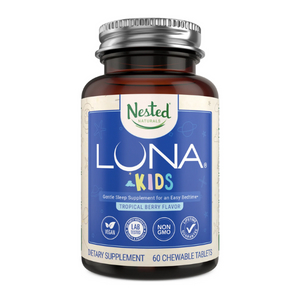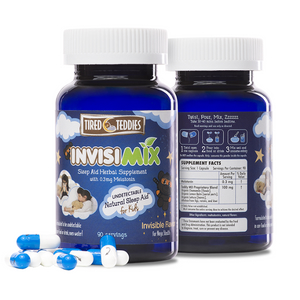5 Best Melatonin For Kids Of 2024: Do These Sleep Aids Work?
All articles are produced independently. When you click our links for purchasing products, we earn an affiliate commission. Learn more about how we earn revenue by reading our advertise disclaimer.
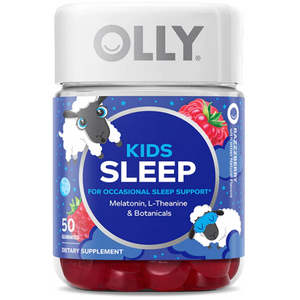
OLLY Kids Sleep
- Free of artificial colors and flavors
- A blend of melatonin, L-theanine, and botanicals to help your child rest
- Certified gluten-free
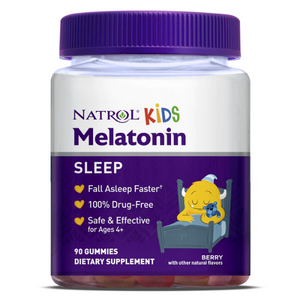
Natrol Kids Melatonin Berry Gummies
- Budget-friendly
- GMP-Certified company
- Delicious berry flavor
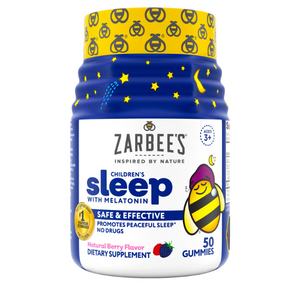
Zarbee’s Children’s Sleep with Melatonin Gummies
- Natural berry flavor
- Free of artificial flavorings, sweeteners, and dyes
- Designed for ages three and up
Children and teens who don’t get enough sleep may experience problem behaviors and health issues[1] such as difficulty concentrating crankiness, high blood pressure, weight problems, and depression. Not to mention that when children are happier and well-rested, so are parents!
Understandably, many parents are searching for ways to help their children get adequate rest each night, and some are considering dietary supplements such as melatonin.
This article explores the safety and effectiveness of melatonin for kids. It also reviews the best melatonin for kids and discusses other natural ways to help your child fall asleep and stay asleep at night.
5 Best Melatonin For Kids On The Market In (April. 2024)
- OLLY Kids Sleep – Editor’s Choice
- Natrol Kids Melatonin Berry Gummies – Best Budget Pick
- Zarbee’s Children’s Sleep with Melatonin Gummies – Best For Ages 3 and Up
- LUNA Kids Nested Naturals – Best Chewable Vegan
- Tired Teddi’s Invisimix – Best Powdered
What Is Melatonin?
Melatonin[2] is a hormone primarily secreted by the pineal gland in the brain in response to darkness. It is known for regulating the body’s natural circadian rhythm — also known as the sleep-wake cycle — by making you tired.
Melatonin supplements, usually made from synthetic melatonin, are sold over the counter in health food stores and drug stores across the United States. Like other dietary supplements, melatonin products are not approved[3] by the United States Food and Drug Administration for safety and effectiveness before they are marketed. This makes it important to carefully research each product to ensure you are giving your child a safe, effective product.
Is Melatonin Safe For Kids?
Generally speaking, melatonin is well-tolerated in doses[4] of up to 3 mg per day in children and 5 mg per day in adolescents.
Although studies suggest short-term melatonin use in children is safe, less is known about the safety of long-term use. According to the American Academy of Pediatrics[1], there is some concern that long-term melatonin use may affect a child’s growth and development, especially during puberty.
The most common side effects reported in children include
- Drowsiness
- Morning sleepiness
- Increased urination at night
Furthermore, melatonin may react with certain medications a child takes. If you consider giving your child melatonin, you must speak with your child’s pediatrician first.
5 Best Melatonin For Kids To Treat Insomnia 2024
OLLY Kids Sleep
OLLY Kids Sleep contains a mild blend of melatonin, L-theanine, and botanical extracts that may encourage your child to rest.
- Includes melatonin and other botanical extracts to help your child rest
- Certified gluten-free
- Free of allergens
- One gram of added sugar per gummy
- Not suitable for children under four
- Lacks third-party certification
OLLY Kids Sleep gummies come in a tasty “razzberry” flavor and are sweetened using glucose syrup and beet sugar. In addition to melatonin, OLLY Kids Sleep vegetarian gummies contain L-theanine, chamomile, passionflower, and lemon balm to promote relaxation.
Some evidence[5] suggests that L-theanine may improve sleep quality in boys with attention-deficit/hyperactivity disorder.
Research[6] also suggests that chamomile extract can improve sleep quality in older adults. Less is known about its effects on children, though.
One gluten-free gummy provides 0.5 mg of melatonin, a very gentle dose. This makes it a great option for children just starting with melatonin. It does, however, contain one gram of added sugar per gummy, which can add up if your child requires more than one gummy. Plus, the added sugar poses problems with potential dental caries because the sugar sticks to the teeth.
While many products sold by OLLY are certified by reputable third-party testing organizations, such as the National Sanitation Foundation, also known as the NSF, it does not appear OLLY Kids Sleep is.
The company states a certificate of analysis, or COA, verifying each product’s potency and purity is available for each product, but it is not easily accessible via OLLY’s website.
All products are produced in facilities audited by the FDA and third-party certifiers, such as NSF, who ensure they comply with current Good Manufacturing Practices[7], which are designated as cGMPs.
A bottle of 70 gummies costs $17.99.
Natrol Kids Melatonin Berry Gummies
Natrol Kids Melatonin Berry Gummies are free of artificial ingredients and affordable, making them a solid option for occasional sleeplessness.
- GMP-Certified company
- Tasty berry flavor
- Free of artificial flavors and high fructose corn syrup
- Lacks third-party certification
Natrol Kids Melatonin Gummies come in a tasty berry flavor and are sweetened using organic tapioca syrup and organic cane sugar. They’re slightly more potent than OLLY Kids Sleep Gummies, containing 1 mg of melatonin per gummy.
Each gummy contains two grams of added sugar, but since they’re higher potency, it’s unlikely that your child will need multiple gummies to feel relaxed.
The gummies are vegetarian and free of gluten, gelatin, synthetic dyes, genetically modified organisms, or GMOs, and artificial sweeteners and flavors.
However, according to the company website, Natrol is certified by GMP, and an in-house team of dedicated testers rigorously tests all products.
A company with a GMP certification can guarantee that products are made in an FDA-regulated facility. Additionally, this means the company is taking all the required quality control steps to produce safe and effective products.
One bottle of 90 gummies costs $16.49.
Zarbee’s Children’s Sleep with Melatonin Gummies
Zarbee’s Children’s Sleep with Melatonin Gummies are free of artificial flavorings and sweeteners and are designed for ages three and up, making them a decent choice for younger kids.
- Free of artificial sweeteners, flavorings, and dyes
- Designed for ages three and up
- Founded by a pediatrician
- Not third-party tested
- Pending class-action lawsuit
- Flavored with honey and cane sugar
Founded by father and pediatrician Dr. Zak Zarbock, Zarbee’s is a well-known manufacturer of quality, over-the-counter medications.
Zarbee’s Children’s Sleep with Melatonin Gummies is designed for children three years and up. It comes in a natural berry flavor and contains 1 mg of melatonin per gummy. These gummies are also allergy-friendly and formulated without milk, egg, fish, soy, peanuts, wheat, and other major allergens.
Each gummy contains two gramsof added sugar that is sweetened using naturally derived added sweeteners, including honey, sucrose, and glucose syrup.
According to Zarbee, this melatonin gummy works best when consumed 30-60 minutes before bedtime.
Of note, there is a proposed class-action lawsuit[8] against Zarbee’s alleging their Children’s Sleep with Melatonin Gummies are consistently overdosed and do not contain the amount of melatonin listed on the bottle.
Additionally, Zarbee’s does not utilize third-party testing to ensure products contain what their label says they do and are free of potentially harmful chemicals.
One bottle of 50 gummies costs $21.95, though they are currently on sale for $14.26.
LUNA Kids Nested Naturals
LUNA Kids is a chewable sleep aid made with a low dose of melatonin and a premium blend of relaxing herbs to promote healthy sleeping habits.
- Vegan
- Free of added sugars
- Contains a blend of herbs and melatonin to promote a good night’s sleep
- Contains the controversial ingredients stevia and xylitol
LUNA Kids comes in a tropical berry-flavored, sugar-free, chewable tablet designed for children ages four and up. It is formulated with a touch of melatonin and a blend of naturally sourced botanicals, such as lemon balm, valerian root powder, and chamomile.
With just 0.2 mg of melatonin in each tablet, it is a good option if your pediatrician suggests starting with a low dose of melatonin.
Clinical evidence[9] suggests valerian root and lemon balm extracts may improve restlessness and insomnia In children under the age of 12. Studies[9] also indicate that combining the two extracts may improve concentration and impulsiveness in children with ADHD.
These chewable tablets contain stevia, which may alter the gut microbiome[10]. However, further studies are needed to determine whether gut microbiome alteration is a negative or positive health experience for humans.
LUNA Kids also contains the sugar alcohol xylitol. While the FDA has approved it as a food additive, like other sugar alcohols, large amounts of xylitol may cause diarrhea and bloat[11] in some individuals.
An in-house lab tests for heavy metals and microbes, and a third party validates the ingredients listed on the label. Lab reports confirming third-party test results are not publicly available at this time.
One container of 60 chewable tablets costs about $14.95.
Tired Teddi’s Invisimix
Tired Teddies Invisimix is a flavorless, powdered supplement containing a low melatonin dose. It is a good option for children two and older.
- Designed for ages two and up
- Made in a GMP, NSF-Certified facility
- Free of artificial sweeteners, preservatives, and flavors
- Lacks third-party testing
- Contains a proprietary blend of botanicals
Tired Teddies Invisimix comes in an encapsulated flavorless powder designed to be mixed into any food or beverage. It is a great choice for children who dislike chewable tablets or gummies. Just twist open the capsule and mix the powder into a beverage your child likes.
The powder comes pre-portioned in a capsule to make dosing easy. Simply twist open the capsule, pour the flavorless powder into your child’s favorite food or beverage, and mix it up.
Each capsule contains 0.3 mg of melatonin, and a proprietary blend of organic chamomile, lemon balm, lettuce, and the natural sweetener allulose from figs, raisins, and kiwi fruit.
Since it is a proprietary blend, the manufacturer does not list the amount of each specific ingredient. If your child has a history of intolerance or sensitivity to any ingredients, it’s best to avoid this product.
This product is made in the USA in a GMP, NSF-certified facility. It also comes with a money-back guarantee, though additional details about this guarantee are not specified on the company website.
One 90-count bottle costs around $23.95.
Benefits Of Using Melatonin Gummies
According to the National Center for Complementary and Integrative Health[12], melatonin supplements may help with certain conditions, including:
- Jet lag
- Some sleep conditions in children
- Anxiety before and after surgery
Children with certain health conditions, such as ADHD, autism spectrum disorder or ASD, atopic dermatitis, attention-deficit disorder, and asthma, are more likely to experience difficulty sleeping than other children.
One 2019 review[12] looked at 18 small, brief studies of melatonin supplements that included 1,021 children. Overall, those who took melatonin supplements experienced improvements in total time to fall asleep and total sleep compared to those who took a placebo.
In particular, researchers noted short-term improvements in children with the following conditions:
- Kids with sleep-onset insomnia fell asleep 24 minutes earlier and slept 25 minutes longer.
- Kids with ASD fell asleep 37 minutes earlier and slept for 48 minutes longer.
- Kids with atopic dermatitis fell asleep 6.8 minutes earlier and slept 35 minutes longer.
- Kids with ADHD fell asleep 20 minutes earlier and slept 33 minutes longer.
How To Choose The Best Melatonin For Kids
Here are a few things to consider when choosing the best melatonin supplement for children.
Type
First and foremost, it’s important to choose a melatonin supplement that your child will take. While many children enjoy gummy supplements, others may prefer chewable tablets. Additionally, some children unwilling to take anything they think is “medicine” may benefit from a flavorless powder that can be discreetly added to their favorite food or beverage.
Keep in mind, though, that gummy supplements are appealing to kids. This makes it essential to keep the supplements out of reach to avoid overconsumption.
According to an analysis of 2012-’21 data[13] from the American Association of Poison Control Centers’ National Poison Data System, 260,435 melatonin ingestions were reported among children and teens. Yearly calls for these ingestions increased 530% from 8,337 in 2012 to 52,563 in 2021.
Around 15% of children mentioned in the above analysis required hospitalization, and 1% required intensive care.
Dosage
The best melatonin dosage and timing for kids vary from child to child. If your child is new to melatonin supplements, consider starting with a product that offers a very low dose. Many children respond well to 0.5 mg or 1 mg[1] when taken 30-90 minutes before bedtime. Though some children, such as those with ADHD, may require more, they generally don’t need more than 3-6 mg of melatonin.
Ingredients
Many children’s melatonin supplements will feature additional botanicals that may help promote healthy sleep patterns. However, these ingredients may interact with other medications or supplements your child may take. This makes it important to work closely with your pharmacist or pediatrician to ensure no interactions occur.
Lastly, avoid supplements high in added sugars and those that contain preservatives and other artificial ingredients.
Quality
Unfortunately, many supplements don’t contain what is listed on the label. One 2017 study[14] that tested 31 different over-the-counter melatonin supplements found that 71% didn’t contain the amount listed on the product label.
Moreover, 26% of the melatonin supplements contained serotonin, a hormone that can lead to negative health effects in children, even at low levels.
Because of this, selecting a brand that utilizes third-party testing is vital to ensure the product contains what the label says it does and is free of other harmful ingredients. At the very least, always buy from a well-known, trusted brand.
Additionally, the American Academy of Pediatrics[1] suggests choosing a supplement that contains the USP verified mark to allow for safer use. This mark indicates that the product contains the ingredients listed on the label, in that amount and potency.
Alternatives To Melatonin
Most experts agree that parents should try other ways to encourage healthy sleep practices before using a melatonin supplement.
Tips for a good night’s sleep[15] include
- Keeping your child’s bedroom free of noise and at a comfortable temperature
- Removing electronic devices from your child’s bedroom
- Avoid giving your child large meals or caffeine before bedtime
- Ensuring your child is active during the day so they can sleep better at night
- Be a role model for your child by establishing and practicing good sleep hygiene
- Establishing a bedtime routine, such as taking a warm bath, practicing yoga, reading a bedtime story, and brushing teeth
- Have set bedtimes and wake-up times every day, including weekends
- Turning out the lights at bedtime as too much light exposure before bed can block melatonin production
Final Thought
Melatonin is a hormone naturally produced by the body. It increases soon after the onset of darkness and helps control your sleep patterns. While most children can improve their sleep patterns by making simple diet and lifestyle changes, others who continue to have trouble falling asleep may benefit from a melatonin dietary supplement.
It’s a good idea to try alternative methods to help your child sleep at night before starting a melatonin supplement. Additionally, if you believe your child may benefit from a melatonin supplement, discuss it with your pediatrician beforehand.
Frequently Asked Questions
Short-term nightly melatonin use is generally considered safe and effective for most children. Because of the limited research regarding the long-term safety of melatonin supplements, they should only be used for short periods.
Most children will respond well to taking 0.5 mg or 1 mg[1] of melatonin at bedtime, while others may require more. However, most children do not need over six milligrams of melatonin daily.
Yes. Melatonin supplements are designed to mimic the effects of the natural sleep hormone, which can contribute to sleepiness.
Melatonin comes in powders, liquids, capsules, and gummies. The best form of melatonin for your child is a form they will take. While gummies are generally the more attractive form to kids, most of them contain added sugar. Not only does this contribute to overall sugar consumption, but it can also wreak havoc on your child’s tooth enamel. Be sure to encourage them to brush their teeth thoroughly shortly after consumption.
+ 15 sources
Health Canal avoids using tertiary references. We have strict sourcing guidelines and rely on peer-reviewed studies, academic researches from medical associations and institutions. To ensure the accuracy of articles in Health Canal, you can read more about the editorial process here
- HealthyChildren.org. (2022). Melatonin for Kids: What Parents Should Know About This Sleep Aid. [online] Available at: https://www.healthychildren.org/English/healthy-living/sleep/Pages/melatonin-and-childrens-sleep.aspx#
- Seithikurippu R, A.M. (2015). Melatonin, the Hormone of Darkness: From Sleep Promotion to Ebola Treatment. Brain Disorders & Therapy, [online] 04(01). doi:10.4172/2168-975x.1000151.
- Office (2022). FDA 101: Dietary Supplements. [online] U.S. Food and Drug Administration. Available at: https://www.fda.gov/consumers/consumer-updates/fda-101-dietary-supplements
- Medlineplus.gov. (2012). Melatonin: MedlinePlus Supplements. [online] Available at: https://medlineplus.gov/druginfo/natural/940.html#Safety
- Lyon (2017). The effects of L-theanine (Suntheanine®) on objective sleep quality in boys with attention deficit hyperactivity disorder (ADHD): a randomized, double-blind, placebo-controlled clinical trial. Alternative medicine review : a journal of clinical therapeutic, [online] 16(4). Available at: https://pubmed.ncbi.nlm.nih.gov/22214254/
- Adib-Hajbaghery, M. and Mousavi, S.N. (2017). The effects of chamomile extract on sleep quality among elderly people: A clinical trial. Complementary Therapies in Medicine, [online] 35, pp.109–114. doi:10.1016/j.ctim.2017.09.010.
- Center (2021). Facts About the Current Good Manufacturing Practices (CGMPs). [online] U.S. Food and Drug Administration. Available at: https://www.fda.gov/drugs/pharmaceutical-quality-resources/facts-about-current-good-manufacturing-practices-cgmps
- Classaction.org. (2022). ClassAction.org. [online] Available at: https://www.classaction.org/news/bottles-of-zarbees-childrens-melatonin-are-overdosed-class-action-alleges
- Gromball, J., Beschorner, F., Wantzen, C., Paulsen, U. and Burkart, M. (2014). Hyperactivity, concentration difficulties and impulsiveness improve during seven weeks’ treatment with valerian root and lemon balm extracts in primary school children. Phytomedicine, [online] 21(8-9), pp.1098–1103. doi:10.1016/j.phymed.2014.04.004.
- Suez, J., Cohen, Y., Valdés-Mas, R., Mor, U., Dori-Bachash, M., Federici, S., Zmora, N., Leshem, A., Heinemann, M., Linevsky, R., Zur, M., Ben-Zeev Brik, R., Bukimer, A., Eliyahu-Miller, S., Metz, A., Fischbein, R., Sharov, O., Malitsky, S., Itkin, M. and Stettner, N. (2022). Personalized microbiome-driven effects of non-nutritive sweeteners on human glucose tolerance. Cell, [online] 185(18), pp.3307-3328.e19. doi:10.1016/j.cell.2022.07.016.
- AMERICAN ACADEMY OF PEDIATRIC DENTISTRY Policy on the Use of Xylitol Review Council Council on Clinical Affairs. (n.d.). [online] Available at: https://www.aapd.org/media/Policies_Guidelines/P_Xylitol.pdf.
- NCCIH. (2014). Melatonin: What You Need To Know. [online] Available at: https://www.nccih.nih.gov/health/melatonin-what-you-need-to-know#
- Jenco, M. (2022). Study: Melatonin ingestions in children spiked 530% over past decade. [online] American Academy of Pediatrics. Available at: https://publications.aap.org/aapnews/news/20503/Study-Melatonin-ingestions-in-children-spiked-530?autologincheck=redirected?nfToken=00000000-0000-0000-0000-000000000000
- Erland, L.A.E. and Saxena, P.K. (2017). Melatonin Natural Health Products and Supplements: Presence of Serotonin and Significant Variability of Melatonin Content. Journal of Clinical Sleep Medicine, [online] 13(02), pp.275–281. doi:10.5664/jcsm.6462.
- Anon, (2022). Do Your Children Get Enough Sleep? [online] Available at: https://www.cdc.gov/chronicdisease/resources/infographic/children-sleep.htm

